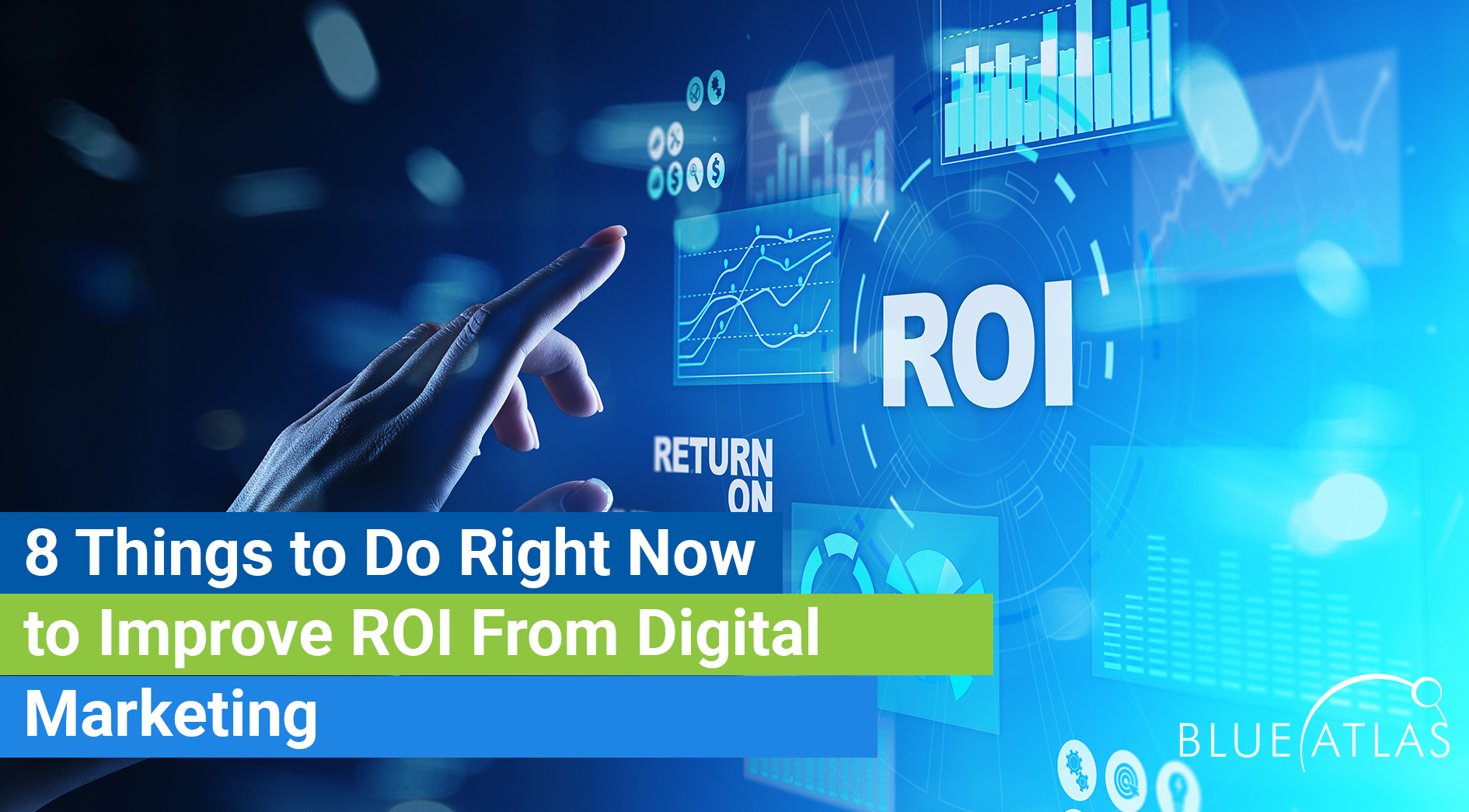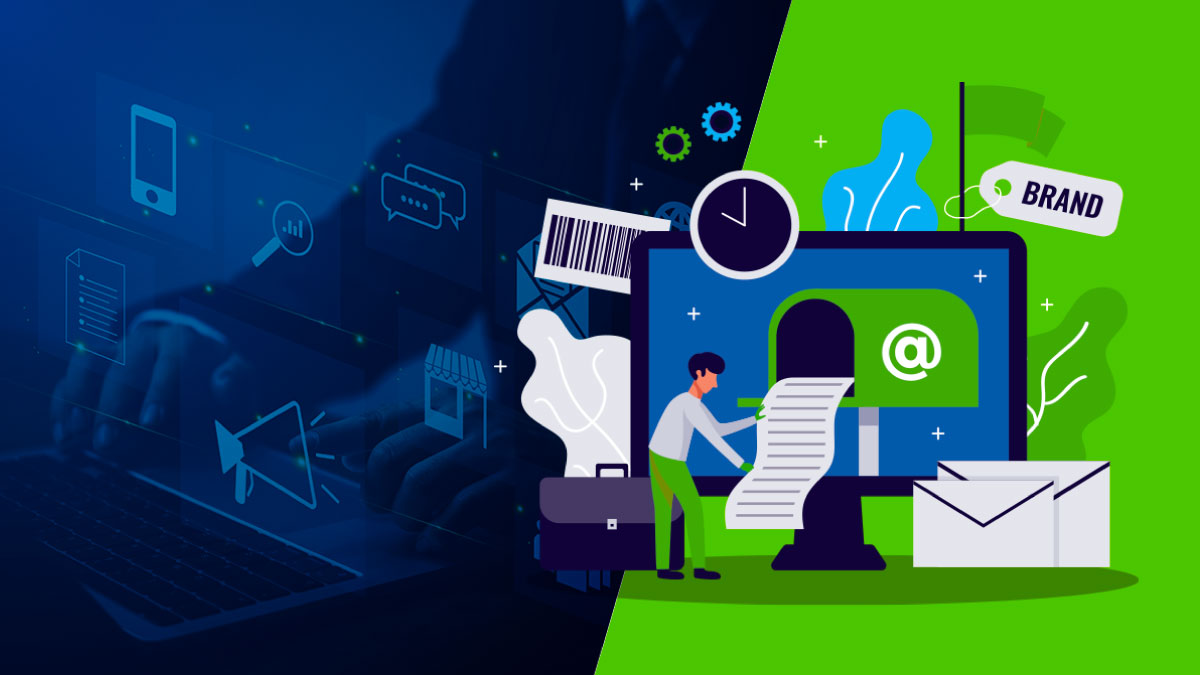Top 15 B2B Marketing Automation Platforms
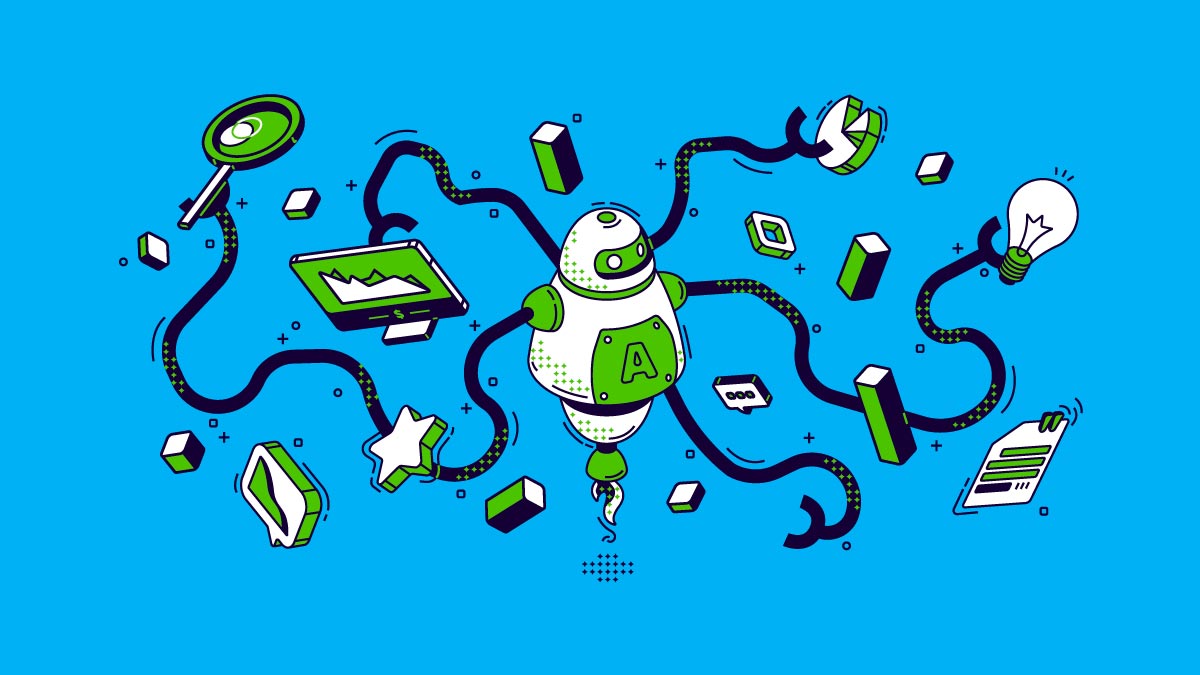
Are you maximizing your B2B marketing potential? With the marketing automation industry projected to grow at an astounding 17.67% annually through 2027, now is the time to harness its power.
B2B marketing automation platforms are transforming the way businesses generate leads and convert prospects, with 80% of users reporting increased leads and 77% achieving higher conversions.
These tools free your team from repetitive marketing tasks, allowing you to focus on what truly matters—building lasting customer relationships.
Ready to streamline your processes and amplify results?
Explore the top marketing automation tools that are driving success in B2B marketing today.
Key Takeaways:
What Is a B2B Marketing Automation Platform?
Think of a marketing automation platform as the engine powering efficient and targeted marketing efforts, freeing teams to focus on strategy and creativity.
At its core, a marketing automation platform is software designed to automate and optimize marketing activities for business-to-business interactions.
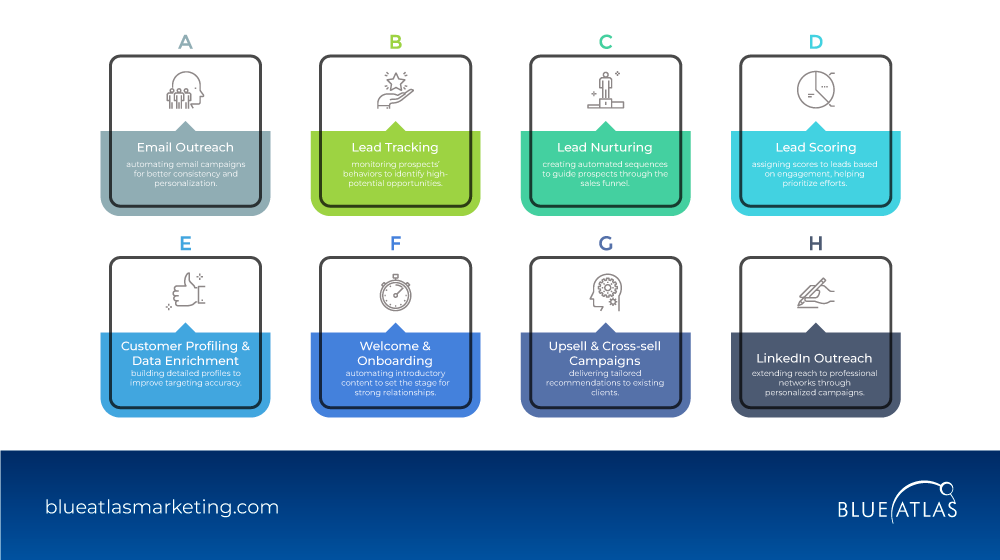
These tools perform a variety of functions that streamline workflows and enhance effectiveness, including:
| Email Outreach | Automating email campaigns for better consistency and personalization. |
| Lead Tracking | monitoring prospects’ behaviors to identify high-potential opportunities. |
| Lead Nurturing | Creating automated sequences to guide prospects through the sales funnel. |
| Lead Scoring | Assigning scores to leads based on engagement, helping prioritize efforts. |
| Customer Profiling & Data Enrichment | Building detailed profiles to improve targeting accuracy. |
| Welcome & Onboarding | Automating introductory content to set the stage for strong relationships. |
| Upsell & Cross-sell Campaigns | Delivering tailored recommendations to existing clients. |
| LinkedIn Outreach | Extending reach to professional networks through personalized campaigns. |
For B2B businesses, these platforms are not just tools but essential components in staying competitive.
They allow marketers to focus on crafting strategies while the platform handles repetitive tasks.
By streamlining processes, businesses can efficiently nurture leads, better align sales and marketing efforts, and improve customer engagement.
To cut the long story short, marketing automation platforms ensure that no lead is overlooked and that every campaign reaches its full potential.
The Top 15 B2B Marketing Automation Platforms
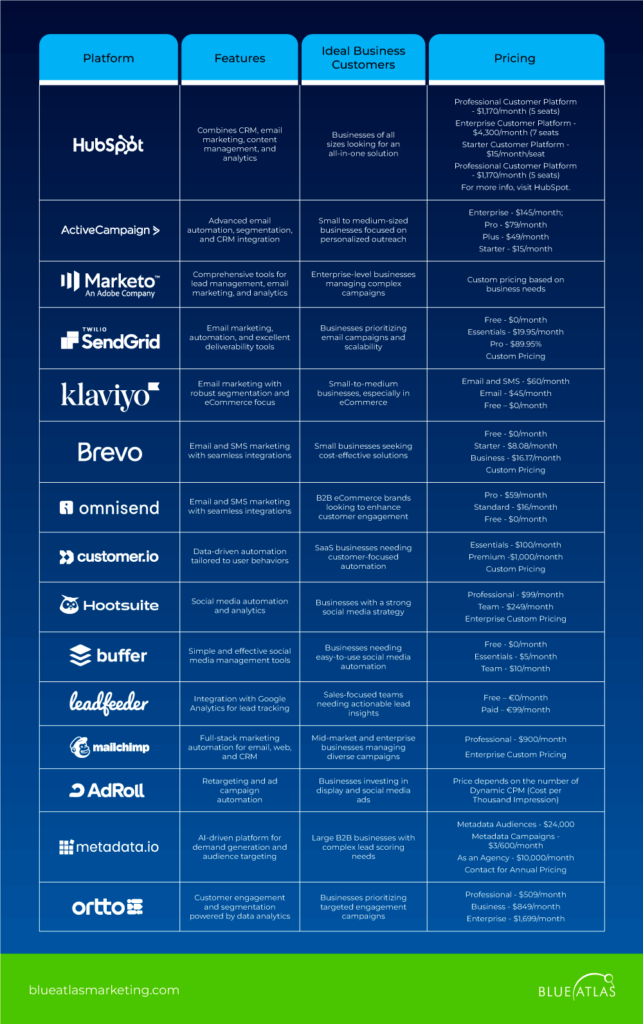
Choosing the right marketing automation platform can transform how your business engages leads and scales growth.
Here’s a look at 15 top platforms to help you make an informed choice:
HubSpot
- Combines CRM, email marketing, content management, and analytics
- Ideal for businesses of all sizes looking for an all-in-one solution
- Pricing:
- Professional Platform: $1,170/month (5 seats)
- Enterprise Platform: $4,300/month (7 seats)
- Starter Platform: $15/month/seat
ActiveCampaign
- Advanced email automation, segmentation, and CRM integration
- Ideal for small to medium-sized businesses focused on personalized outreach
- Pricing:
- Enterprise: $145/month
- Pro: $79/month
- Plus: $49/month
- Starter: $15/month
Adobe Marketo
- Comprehensive tools for lead management, email marketing, and analytics
- Ideal for enterprise-level businesses managing complex campaigns
- Custom pricing based on business needs
SendGrid
- Email marketing, automation, and excellent deliverability tools
- Ideal for businesses prioritizing email campaigns and scalability
- Pricing:
- Free: $0/month
- Essentials: $19.95/month
- Pro: $89.95/month
- Custom Pricing
Klaviyo
- Email marketing with robust segmentation and eCommerce focus
- Ideal for small-to-medium businesses, especially in eCommerce
- Pricing:
- Email and SMS: $60/month
- Email: $45/month
- Free: $0/month
Brevo
- Email and SMS marketing with seamless integrations
- Ideal for small businesses seeking cost-effective solutions
- Pricing:
- Free: $0/month
- Starter: $8.08/month
- Business: $16.17/month
- Custom Pricing
Omnisend
- Email, SMS, and workflow automation for targeted campaigns
- Ideal for B2B eCommerce brands looking to enhance customer engagement
- Pricing:
- Pro: $59/month
- Standard: $16/month
- Free: $0/month
Customer.io
- Data-driven automation tailored to user behaviors
- Ideal for SaaS businesses needing customer-focused automation
- Pricing:
- Essentials: $100/month
- Premium: $1,000/month
- Custom Pricing
Hootsuite
- Social media automation and analytics
- Ideal for businesses with a strong social media strategy
- Pricing:
- Professional: $99/month
- Team: $249/month
- Enterprise: Custom Pricing
Buffer
- Simple and effective social media management tools
- Ideal for businesses needing easy-to-use social media automation
- Pricing:
- Free: $0/month
- Essentials: $5/month
- Team: $10/month
Leadfeeder
- Integration with Google Analytics for lead tracking
- Ideal for sales-focused teams needing actionable lead insights
- Pricing:
- Free: €0/month
- Paid: €99/month
AdRoll
- Retargeting and ad campaign automation
- Ideal for businesses investing in display and social media ads
- Pricing depends on the number of Dynamic CPM (Cost per Thousand Impression)
Metadata.io
- AI-driven platform for demand generation and audience targeting
- Ideal for large B2B businesses with complex lead scoring needs
- Pricing:
- Metadata Audiences: $24,000/month
- Metadata Campaigns: $3/600/month
- As an Agency: $10,000/month
- Contact for Annual Pricing
Ortto
- Customer engagement and segmentation powered by data analytics
- Ideal for businesses prioritizing targeted engagement campaigns
- Pricing:
- Professional: $509/month
- Business: $849/month
- Enterprise: $1,699/month
Mailchimp
- Email marketing with automation, analytics, and customizable templates
- Ideal for small to medium-sized businesses looking for a user-friendly platform
- Pricing:
- Free: $0/month
- Essentials: $11/month
- Standard: $17/month
- Premium: $299/month
How to Choose Marketing Automation Software
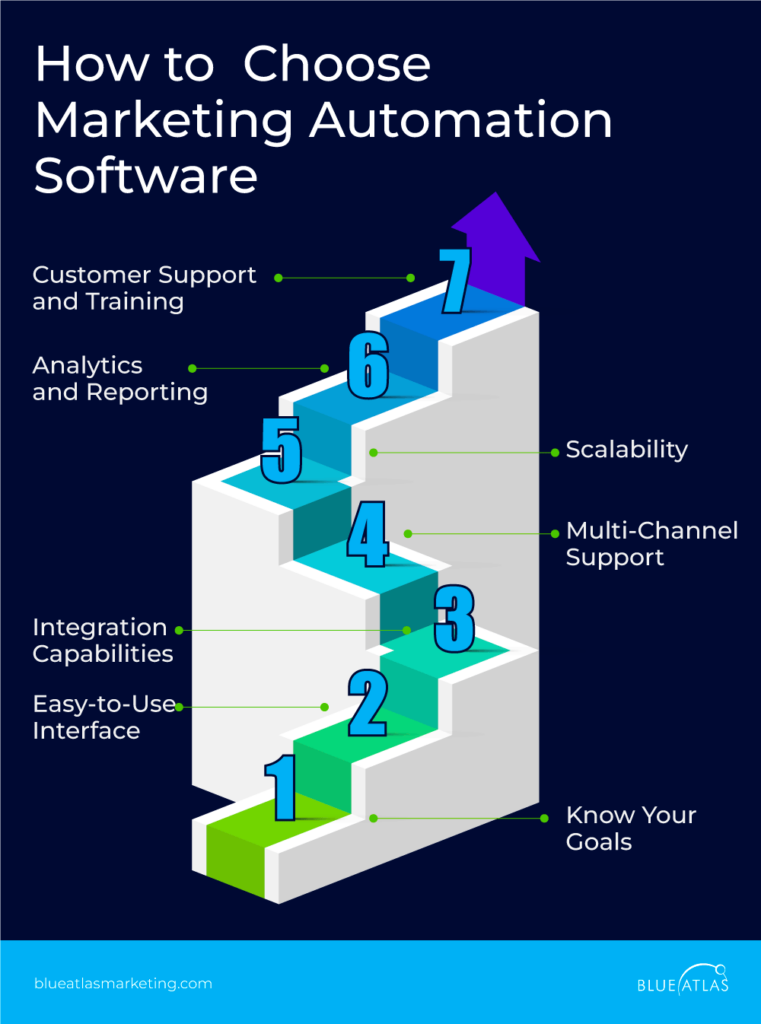
Selecting the right marketing automation platform can feel overwhelming, but breaking the process into key considerations ensures you make a smart investment.
Below are the essential factors to evaluate.
Know Your Goals
Every business has unique marketing needs; identifying yours is the first step in choosing the right platform.
Start by asking these questions: What do you hope to achieve with marketing automation? How will success be measured? Which KPIs are most relevant to your goals?
Whether your focus is on lead generation, customer engagement, or sales alignment, having a clear vision helps narrow your options.
Look for platforms that align with your business objectives and offer features designed to meet those needs.
For example, if increasing conversions is your priority, prioritize tools with strong lead-nurturing capabilities.
Remember, a platform’s value lies in its ability to address your specific challenges, not just its features. Think long-term and ensure the software supports your strategic vision.
Easy-to-Use Interface
A platform’s usability directly impacts its adoption by your team.
Complex tools with steep learning curves can hinder productivity, while intuitive interfaces empower your team to hit the ground running.
Choose software that offers comprehensive training materials, such as tutorials and webinars.
A straightforward design and responsive customer support can significantly reduce the learning curve.
Platforms like HubSpot and ActiveCampaign are known for their user-friendly dashboards.
Simplicity doesn’t mean sacrificing functionality.
The best platforms balance ease of use with powerful capabilities, ensuring your team spends more time executing campaigns and less time troubleshooting.
Integration Capabilities
Your marketing automation platform should work seamlessly with your existing tools, like your CRM, email client, or analytics software.
Lack of integration can create data silos, duplicating effort and leading to inefficiencies.
Look for platforms that support integrations with popular tools such as Salesforce, Google Analytics, or Slack.
This ensures smoother workflows, unified data, and accurate reporting.
Additionally, opt for software with scalable integration options to accommodate future needs as your business grows.
Integration isn’t just about compatibility—it’s about enhancing productivity and eliminating barriers between teams.
Make sure the platform facilitates seamless communication across your entire tech stack.
Multi-Channel Support
Modern marketing isn’t confined to a single channel.
Your platform should support campaigns across email, social media, SMS, and more to ensure a cohesive experience for your audience.
Multichannel marketing allows you to meet prospects where they are, whether it’s an email inbox or a LinkedIn feed.
A quality platform lets you coordinate efforts across channels, track interactions, and tailor messaging to specific audiences.
Platforms like Omnisend excel at managing multichannel campaigns, ensuring that your message stays consistent and effective no matter where it’s delivered.
Scalability
Your business needs today might look very different in a year.
That’s why it’s crucial to choose a platform that scales with your growth.
Scalability ensures you can handle increased demand without sacrificing performance.
Platforms like Marketo and ActiveCampaign offer features that adapt to growing needs, such as larger contact lists or advanced campaign automation.
Look for flexible pricing plans and expandable functionality that won’t limit your growth.
Scalable platforms automate repetitive tasks, freeing your team to focus on strategic initiatives as your operations expand.
Make scalability a key criterion to future-proof your investment.
Analytics and Reporting
Data is the backbone of successful marketing.
A quality platform provides actionable insights through detailed analytics and reporting tools.
Key metrics like open rates, click-through rates, conversions, and ROI should be easily trackable.
Dashboards that visualize performance help you identify trends and areas for improvement. Platforms like HubSpot and Klaviyo are known for their extensive reporting capabilities.
Choose software that not only collects data but also helps you interpret it.
Reports should be exportable and customizable to meet your unique needs, enabling better decision-making.
Customer Support and Training
Even the best platforms come with a learning curve.
Reliable customer support ensures you can address issues quickly, minimizing disruptions to your campaigns.
Look for platforms that offer multiple support channels, such as live chat, email, and phone.
Moreover, vigorous training resources—tutorials, webinars, guides—are invaluable for helping your team master the software.
Support and training go hand in hand in maximizing your platform’s potential.
Platforms like Act-On and Brevo are recognized for their excellent customer support and training programs, making them a smart choice for teams of all sizes.
Benefits of Using a Marketing Automation Platform for B2B Businesses
Adopting a marketing automation platform provides B2B companies with powerful benefits, including streamlining the marketing automation workflow and enhancing customer interactions.
Marketing and Sales Alignment
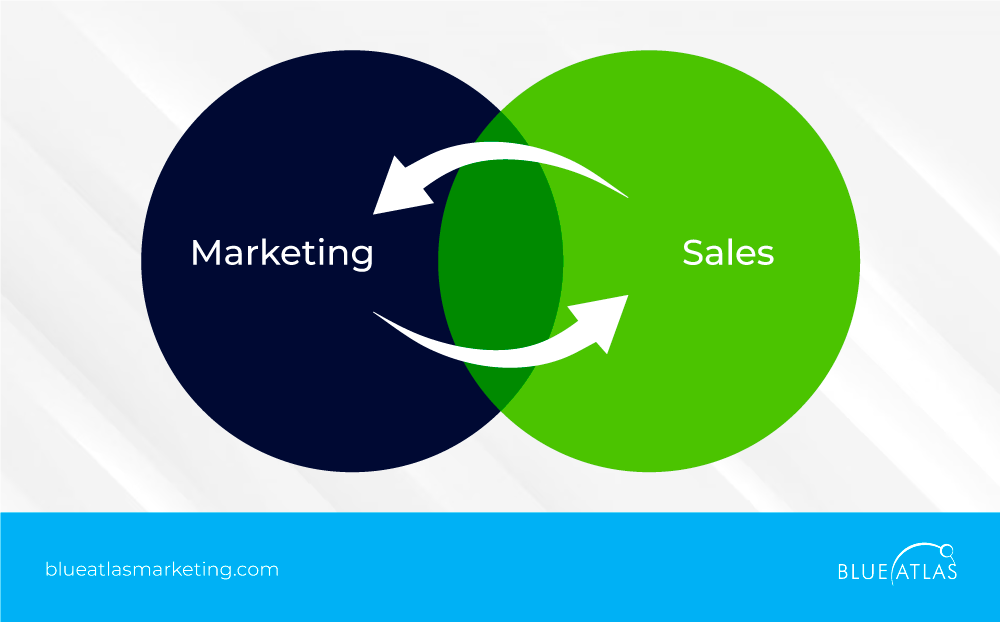
When sales and marketing teams operate in silos, opportunities often fall through the cracks.
Marketing automation bridges this gap, fostering collaboration by aligning goals and streamlining communication.
With shared access to data, teams can stay updated on lead progress and coordinate strategies effectively.
Aligned teams collaborate to nurture leads, share insights, and track metrics that matter to both departments.
For example, automation tools can notify sales teams of high-priority leads based on scoring models while providing marketing teams with feedback on the quality of those leads.
This mutual support improves pipeline visibility and strengthens overall performance.
Increased Conversion Rate
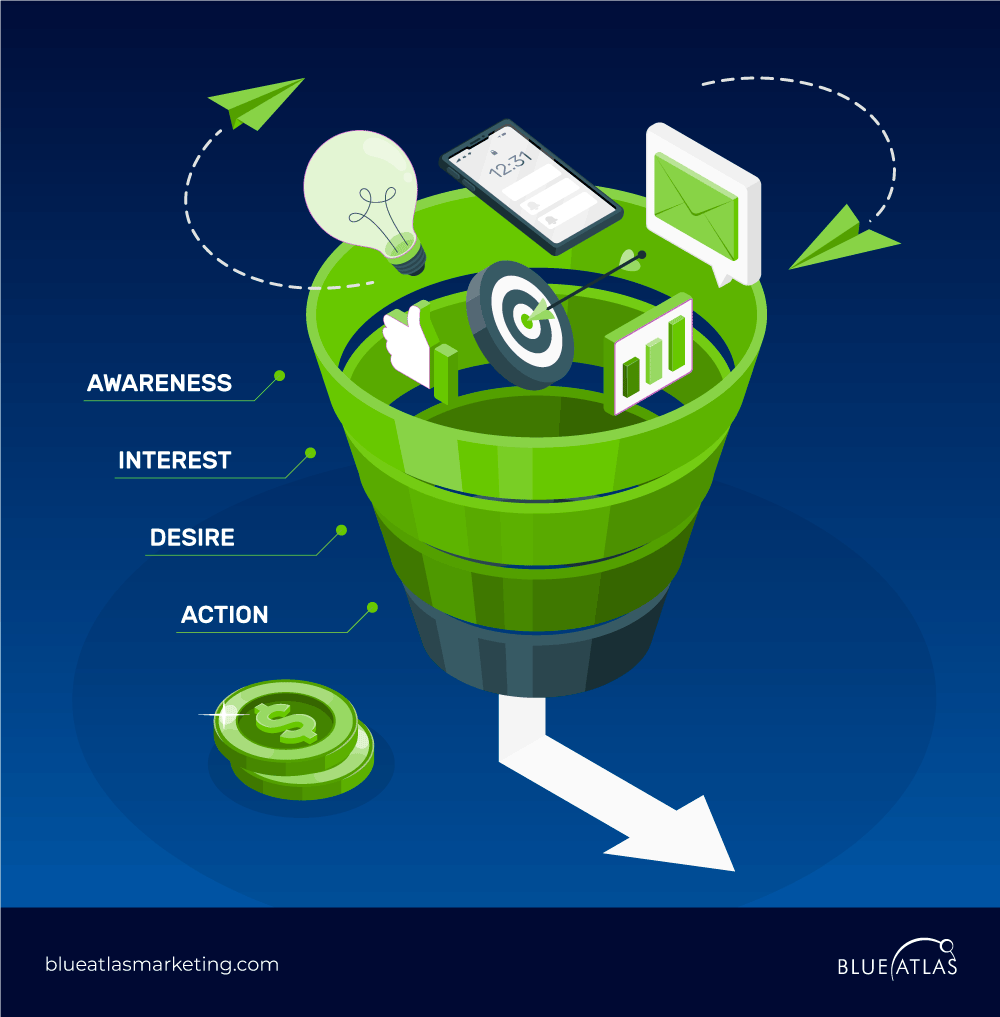
Nurturing leads is essential for boosting conversions, and automation makes this process seamless.
Automating follow-ups and tailoring content to individual prospects allows businesses to guide leads through the sales funnel more efficiently.
Automation tools allow companies to craft personalized messages that resonate with each prospect’s needs and preferences.
For instance, workflows can trigger targeted emails based on user behavior, ensuring timely communication that builds trust.
This approach accelerates the buyer’s journey and deepens engagement, leading to more closed deals.
Accurate Reporting
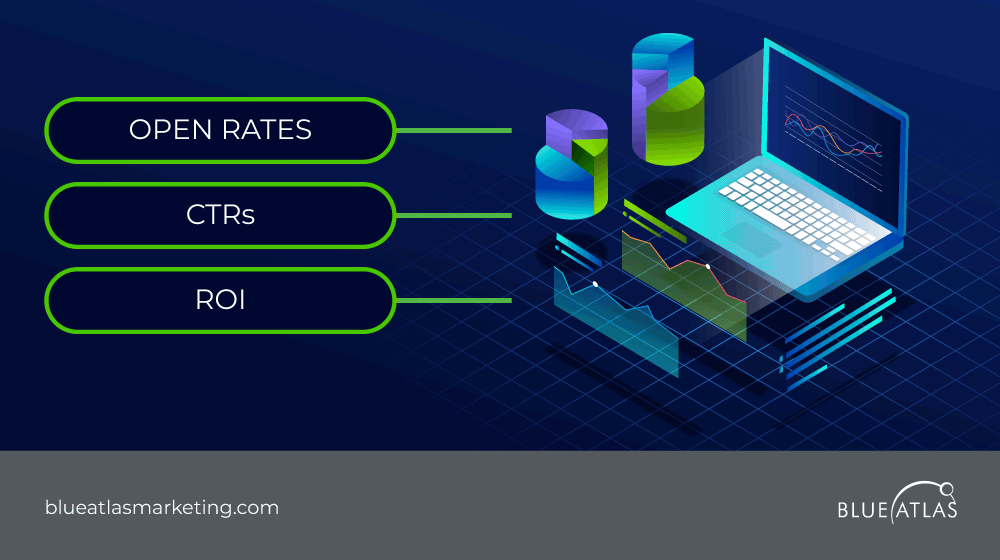
Accurate data is the foundation of effective decision-making, and marketing automation platforms excel at delivering actionable insights.
These tools provide real-time analytics, enabling teams to precisely track campaign performance and customer behavior.
From open rates to revenue impact, automation platforms consolidate metrics into easy-to-read dashboards.
This empowers marketing managers to identify what’s working and adjust strategies accordingly.
With cleaner, more reliable data, businesses can confidently allocate resources and seize opportunities as they arise.
Data Management
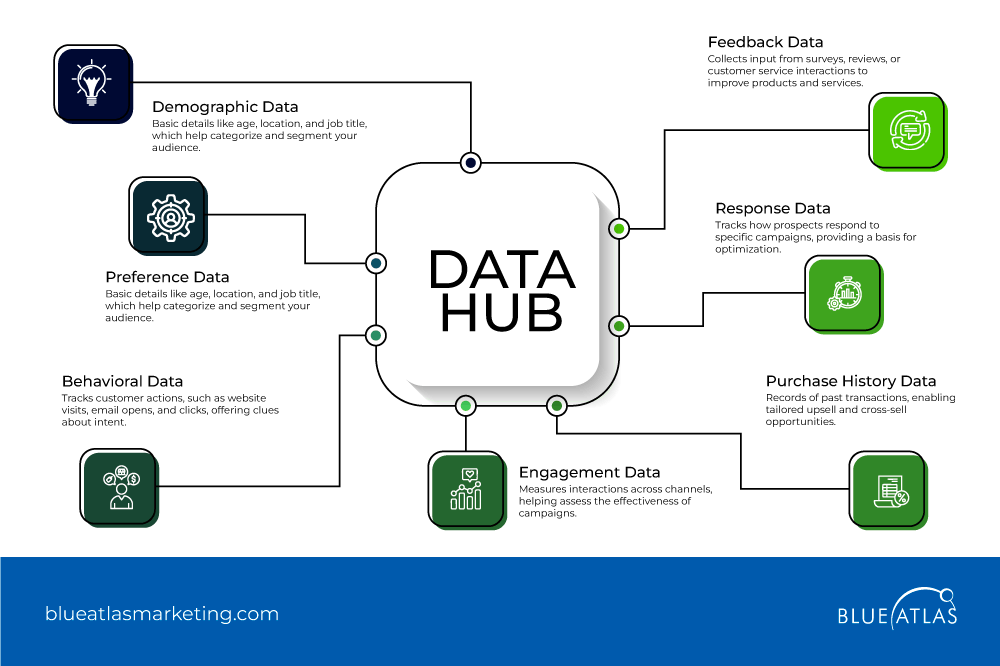
Managing customer data effectively is critical for successful marketing campaigns.
Marketing automation platforms simplify this by collecting, organizing, and enriching data to deliver personalized and targeted experiences.
Here are the key types of data managed by these tools:
Segmenting and analyzing this information empowers marketers to deliver relevant messages and make informed decisions.
Lead Nurturing
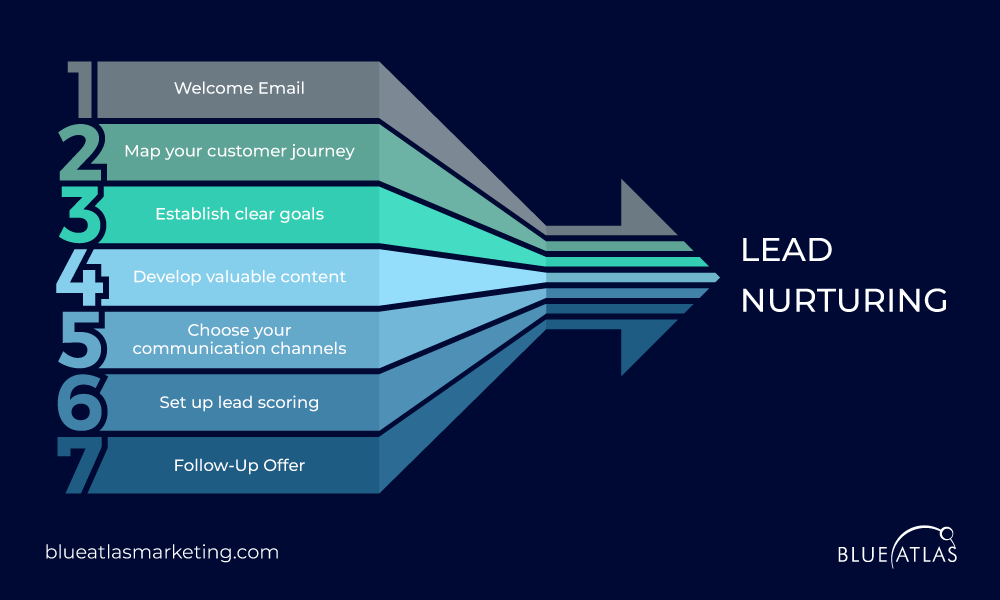
Lead nurturing is critical for maintaining engagement throughout the buyer’s journey, and automation platforms excel in this area.
Businesses can keep leads moving through the funnel without manual intervention by automating repetitive tasks, such as follow-ups and content delivery.
For example, workflows can be set to send educational content to new leads, product updates to existing prospects, or promotional offers to high-priority targets.
This continuous engagement saves time and builds relationships that lead to conversions.
Frequently Asked Questions (FAQs)
How can I choose the right B2B marketing automation platform?
Choose a B2B marketing automation platform that aligns with your business goals, offers ease of use, integrates with various channels, scales with your business, and provides strong reporting. Ensure it supports email marketing automation and social media marketing.
How can B2B marketing automation software help my business?
B2B marketing automation software automates repetitive tasks, streamlines lead nurturing, aligns sales and marketing teams, and provides valuable insights. It helps optimize campaigns across various channels, including email and social media marketing, improving customer engagement and conversion rates.
What is the best marketing automation platform for startups?
For startups, ActiveCampaign and Brevo offer affordable, scalable solutions. These platforms provide strong email marketing automation, integrate with various channels, and help nurture leads and improve customer engagement, making them ideal for growing businesses with limited resources.
The right B2B marketing automation platform has the power to revolutionize your marketing strategy, seamlessly aligning teams, enhancing conversions, and optimizing workflows.
However, success goes beyond the tools themselves. Your website serves as the backbone, turning automation efforts into meaningful connections with potential customers.
From optimized landing pages to effective use of every marketing channel, a strong digital foundation ensures your platform delivers measurable results. With the right combination of tools and strategy, your marketing efforts can achieve new heights.
Why Blue Atlas Marketing?
We deliver better results at the right time. Our marketing automation services streamline lead nurturing and sales processes, helping you drive growth and capitalize on every opportunity.
Schedule your free consultation today!


